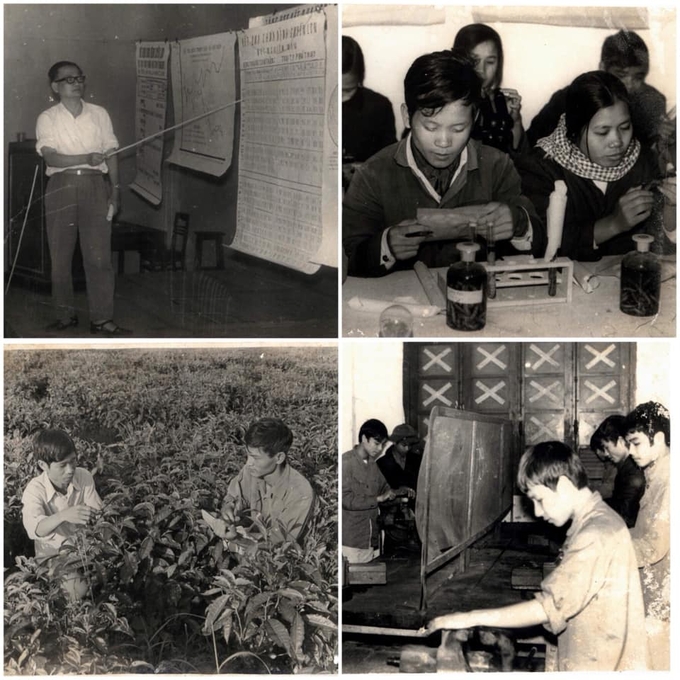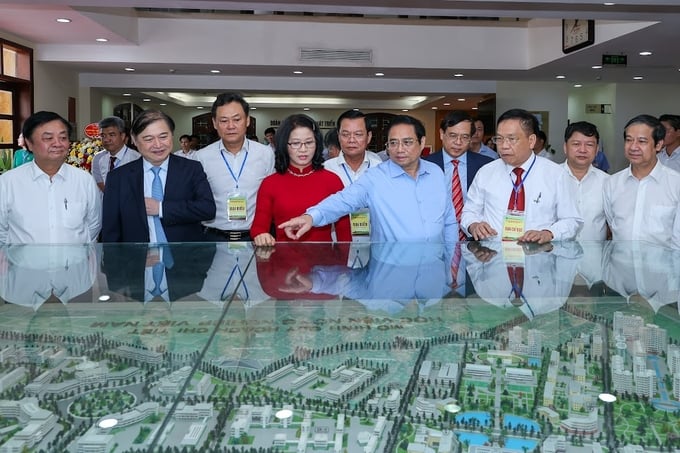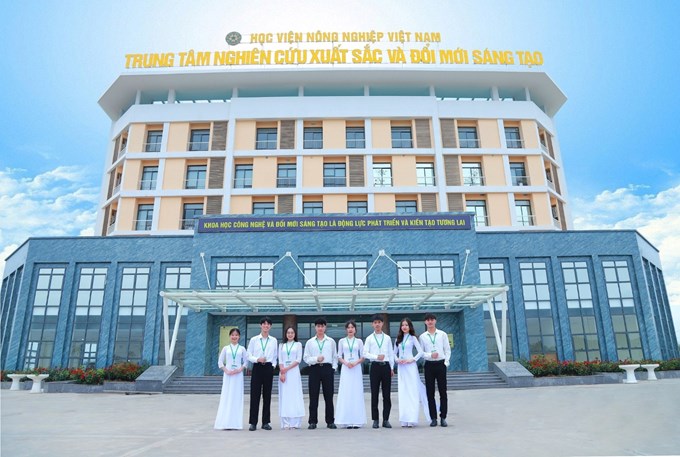May 29, 2025 | 18:36 GMT +7
May 29, 2025 | 18:36 GMT +7
Hotline: 0913.378.918
May 29, 2025 | 18:36 GMT +7
Hotline: 0913.378.918

Vietnam National University of Agriculture (formerly the Dean of the University of Agriculture and Forestry) in its early establishment days. Photo: VNUA.
Vietnam National University of Agriculture (formerly the Faculty of Agriculture and Forestry) was established on October 12, 1956, under Decree No. 53/NL-QT-ND of the Ministry of Agriculture and Forestry, with three initial faculties: Crop Science, Animal Husbandry & Veterinary Medicine, and Forestry. In 1967, it was renamed University of Agriculture I, which later supported the founding of University of Agriculture II. In 1970, the university contributed to the establishment of University of Agriculture III in Bac Thai. During the U.S. bombing of the North, the university set up training sites in evacuation areas and sent thousands of staff and students to join the war effort.
After national reunification, the university sent more than 100 staff and lecturers to bolster colleges and universities in the South and Central Highlands. It also deployed thousands of staff and students to participate in agricultural planning surveys in the Mekong Delta and Central Highlands, providing crucial scientific input for state and local agricultural development strategies.
Between 1986 and 1989, amid the nation’s broader challenges, the university struggled to overcome difficulties, with annual enrollment hovering around just 250–300 students. Despite slow progress in some activities, the university recognized that it was not only a training and research institution but also a center for practical applications and production based on market demand. This shift marked a new era of innovation.
Since 1996, annual enrollment has increased to 1,500 students across 21 disciplines. The university has also advanced in technology transfer, developing models for integrated agricultural and forestry production, multi-cropping in lowland areas, hybrid rice production, and lean hybrid pigs for export.
International cooperation has flourished, particularly in training partnerships with foreign institutions. Each year, the university welcomes and collaborates with approximately 100 international delegations. Scientific research is conducted through bilateral agreements between the university and global universities and research institutions.
In response to societal needs, the university has expanded its faculties and training programs, with student enrollment reaching 40,000.

The Prime Minister attends the 2022 Innovation and Entrepreneurship Journey and Job Fair at Vietnam National University of Agriculture. Photo: VGP.
Since 2015, the university has achieved significant milestones, advancing its autonomy and enhancing its governance structure through the Party Committee, University Council, and Board of Directors. This has contributed to reshaping the role of the University Council within higher education institutions.
During this time, many senior Party and State leaders have shown a keen interest in the university. General Secretary Nguyen Phu Trong visited the campus and attended the 2018–2019 academic year opening ceremony, along with other high-ranking officials who have made visits.
Training programs have continued to thrive, with annual enrollment meeting targeted goals. The university now supports around 30,000 students, graduate students, and researchers. New departments and specialized programs have been established to align with evolving societal demands.
In science and technology, the university has made remarkable progress. Numerous research groups have been organized, and several promising scientific and technological products have been successfully commercialized, addressing societal needs. New breeds of livestock and plants have been introduced into production, while research on vaccines for livestock diseases has led to significant advancements. Each year, hundreds of research articles are published in prestigious scientific journals worldwide.
The university’s international cooperation has seen remarkable progress. It has hosted dignitaries such as the President of the Lao National Assembly and U.S. state governors. The university's director participated in the Prime Minister's delegation, signing multiple memorandums of understanding with partners in the Netherlands, Belgium, and Luxembourg. Additionally, agreements were signed with partners in Australia and New Zealand as part of the National Assembly Chairman's delegation. The World Bank's SAHEP-VNUA project has been implemented at the university, significantly enhancing its research and training capabilities, while the KOICA project has further contributed to its development.

Center for Excellence in Research and Innovation at Vietnam National University of Agriculture. Photo: VNUA.
The university's infrastructure continues to evolve, with 13 newly built projects, including the completion of internal roads, the Central Building, and various research and technology facilities. Among these, the standout is the Center for Research Excellence and Innovation, symbolizing the university’s growing technical and scientific strength.
Strong connections and partnerships with businesses and local communities have greatly contributed to enhancing the quality of human resource training, aligning it with market demands. Vietnam National University of Agriculture has truly entered a new phase of development, integrating itself into the historical and modern journey of the Vietnamese people’s rise.
The university’s history will always honor the contributions of past generations, especially the pioneers who laid the foundation. More valuable than anything is the legacy they have left us—a solid platform from which we can think, act, and together build a brighter future, achieving what they could only dream of.
The staff, faculty, and workers are determined to continue "tirelessly striving" more than ever, pushing the university forward to realize the dreams and aspirations of many generations, propelling Vietnam National University of Agriculture to even greater heights!
Translated by Quynh Chi

(VAN) Ms. Nguyen Thi Dung, Deputy Director of Ngoc Hoang Cooperative, shared about the journey of bringing dragon fruit to Europe, achieving annual revenues in the billions of VND.

(VAN) Bamboo products from Thang Tho Bamboo Cooperative have reached many countries around the world, while also creating jobs for local workers.

(VAN) The Management Board of Con Dao National Park reported that a green sea turtle, tagged in the Philippines, has traveled thousands of kilometers to lay 84 eggs on Bay Canh Islet.

(VAN) Green technology is paving a new path for sustainable aquaculture in the Mekong Delta in particular and across the country in general, helping reduce emissions and adapt to climate change.

(VAN) On May 27, La French Tech Vietnam (the French startup and innovation community in Vietnam) held the French Tech Summit Vietnam 2025.
/2025/05/27/4731-2-223159_980.jpg)
(VAN) No votive paper, no styrofoam, no plastic bags, no plastic bottles, and no single-use plastic trays are the key rules tourists should keep in mind when visiting Con Dao.

(VAN) In the fight against plastic pollution, Vietnam has been demonstrating a proactive, pioneering, and active role in addressing the greatest environmental challenge today.